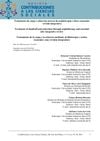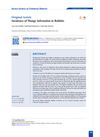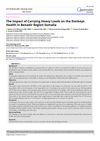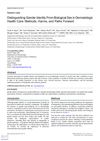 June 2024 in “International journal of nanomedicine”
June 2024 in “International journal of nanomedicine” Azelaic acid micro/nanocrystals, especially with ultrasound and salicylic acid, greatly improve acne treatment.
 May 2024 in “Pakistan Journal of Health Sciences”
May 2024 in “Pakistan Journal of Health Sciences” Iron deficiency is linked to hair loss in CTE patients.
 April 2024 in “Contribuciones a las ciencias sociales”
April 2024 in “Contribuciones a las ciencias sociales” Combining essential oils with clay therapy effectively treats dandruff and seborrhea.
 April 2024 in “Iranian journal of veterinary medicine”
April 2024 in “Iranian journal of veterinary medicine” 43.1% of rabbits in Mosul City had mange, with Sarcoptes scabiei var. cuniculi being the most common.
 March 2024 in “Journal of pharmacopuncture”
March 2024 in “Journal of pharmacopuncture” Hominis Placenta Pharmacopunture helped regrow hair in a patient with stress-induced hair loss.
 March 2024 in “Revista Ciências da Saúde CEUMA”
March 2024 in “Revista Ciências da Saúde CEUMA” Testosterone increases sexual behavior in female capuchin monkeys.
 March 2024 in “Clinical, cosmetic and investigational dermatology”
March 2024 in “Clinical, cosmetic and investigational dermatology” Severe alopecia areata greatly impacts quality of life, mental health, and daily activities.
 February 2024 in “International neuropsychiatric disease journal”
February 2024 in “International neuropsychiatric disease journal” Alopecia areata severely impacts quality of life, mental health, and work productivity.
 January 2024 in “International Journal of Research Publication and Reviews”
January 2024 in “International Journal of Research Publication and Reviews” The herbal hair serum with rosemary, hibiscus, and neem is safe and effective for hair care.
 January 2024 in “GeroScience”
January 2024 in “GeroScience” Using radiation to make mice's hair turn gray helps study and find ways to prevent or reverse hair graying.
 January 2024 in “International journal of pharmaceutical sciences review and research”
January 2024 in “International journal of pharmaceutical sciences review and research” Indian jujube has many medicinal properties and can help treat ailments like diabetes, inflammation, and cancer.
 December 2023 in “Veterinary medicine. Open journal”
December 2023 in “Veterinary medicine. Open journal” Carrying heavy loads harms donkeys' health, causing pain and injuries.
 December 2023 in “Frontiers in endocrinology”
December 2023 in “Frontiers in endocrinology” Excess androgens may cause PCOS, not just be a symptom.
 October 2023 in “JOJ dermatology & cosmetics”
October 2023 in “JOJ dermatology & cosmetics” Thiocyanate helps hair growth and can be supplemented in diet or applied topically.
 September 2023 in “Journal of microbiology and biotechnology”
September 2023 in “Journal of microbiology and biotechnology” A type of collagen helps hair grow by boosting cell growth and activating a specific hair growth pathway.

Bee pollen, green tea, essential oils, and various plant extracts improve skin and hair health.
 August 2023 in “International journal of research in dermatology”
August 2023 in “International journal of research in dermatology” Janus kinase inhibitors are effective and generally safe for treating hair loss in adults with alopecia areata.
 August 2023 in “Vittalle”
August 2023 in “Vittalle” Mais estudos são necessários para garantir a eficácia e qualidade dos tratamentos de alopecia com plantas medicinais.
 August 2023 in “Malaysian Journal of Medicine and Health Sciences/Malaysian journal of medicine and health sciences”
August 2023 in “Malaysian Journal of Medicine and Health Sciences/Malaysian journal of medicine and health sciences” Pueraria mirifica extract may help treat benign prostatic hyperplasia.
 July 2023 in “Research Square (Research Square)”
July 2023 in “Research Square (Research Square)” Certain gut bacteria may protect against alopecia areata, while others may increase the risk.
 June 2023 in “International journal of research in ayurveda and pharmacy”
June 2023 in “International journal of research in ayurveda and pharmacy” Dhatryadi Rasayana, an Ayurvedic herbal mix, may be a safe and effective way to prevent premature hair greying.

Both treatments for localized alopecia areata are equally effective.

Custom skincare can be made based on genes, fewer cats in Lublin have FeLV/FIV than national average, and studies also looked at small water bodies, river pollution, guppy growth, toxins in biochars, palm oil issues, and pumpkin seed oil for hair strength.
 March 2023 in “Journal of clinical review & case reports”
March 2023 in “Journal of clinical review & case reports” Frontal Fibrosing Alopecia mainly affects postmenopausal Mexican women, requiring early detection to prevent permanent hair loss.

Accurate gender and sex assessment in dermatology is essential for respectful and precise patient care.
 February 2023 in “Vlaams dierengeneeskundig tijdschrift”
February 2023 in “Vlaams dierengeneeskundig tijdschrift” Two young cats with a severe ear and skin condition improved with immune system-targeting treatments.
 January 2023 in “Rossijskij žurnal kožnyh i veneričeskih boleznej”
January 2023 in “Rossijskij žurnal kožnyh i veneričeskih boleznej” New treatments for child hair loss due to immune issues are effective but not yet officially approved.
 January 2023 in “Pesquisa Veterinária Brasileira”
January 2023 in “Pesquisa Veterinária Brasileira” A KRT71 mutation in Hereford cattle in Uruguay causes thin, curly hair and scaly skin.
 December 2022 in “International Journal of Biomedicine”
December 2022 in “International Journal of Biomedicine” Androgens may worsen COVID-19 and hair loss could indicate the disease's severity.
 October 2022 in “Journal of experimental and clinical medicine”
October 2022 in “Journal of experimental and clinical medicine” Repurposing existing drugs for COVID-19 shows promise but requires more research to confirm effectiveness.






























